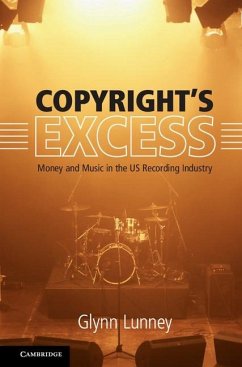For more than two hundred years, copyright in the United States has rested on a simple premise: more copyright will lead to more money for copyright owners, and more money will lead to more original works of authorship. In this important, illuminating book, Glynn Lunney tests that premise by tracking the rise and fall of the sound recording copyright from 1961-2015, along with the associated rise and fall in sales of recorded music. Far from supporting copyright's fundamental premise, the empirical evidence finds the exact opposite relationship: more revenue led to fewer and lower-quality hit songs. Lunney's breakthrough research shows that what copyright does is vastly increase the earnings of our most popular artists and songs, which - net result - means fewer hit songs. This book should be read by anyone interested in how copyright operates in the real world.
Dieser Download kann aus rechtlichen Gründen nur mit Rechnungsadresse in A, B, BG, CY, CZ, D, DK, EW, E, FIN, F, GR, HR, H, IRL, I, LT, L, LR, M, NL, PL, P, R, S, SLO, SK ausgeliefert werden.


